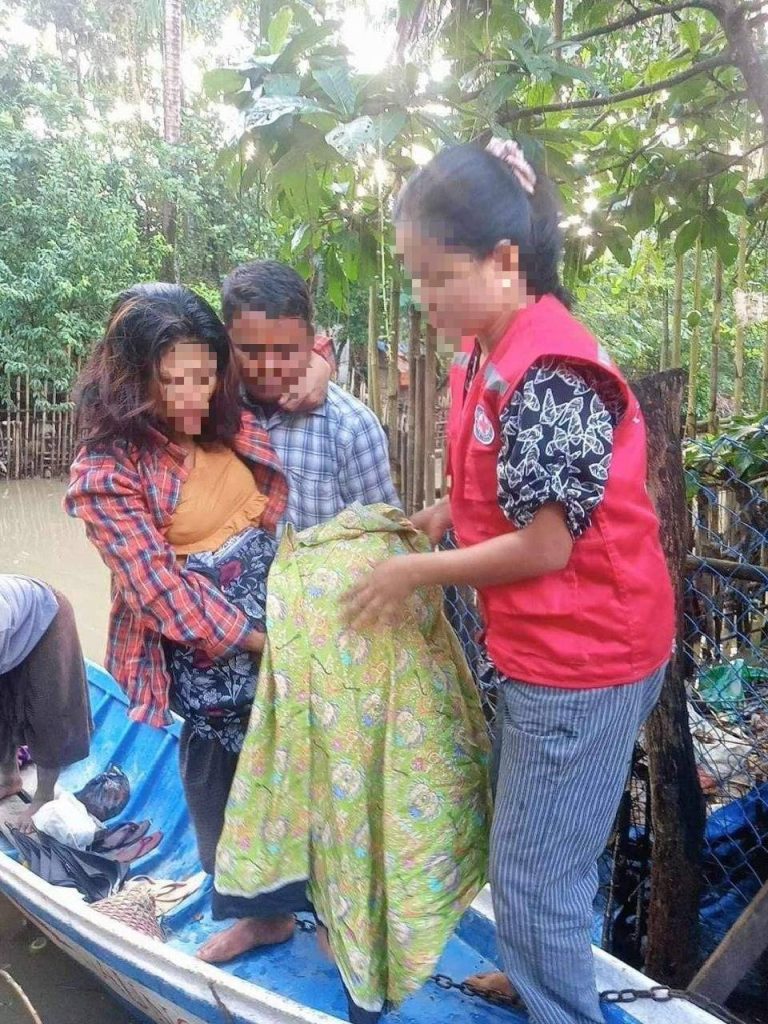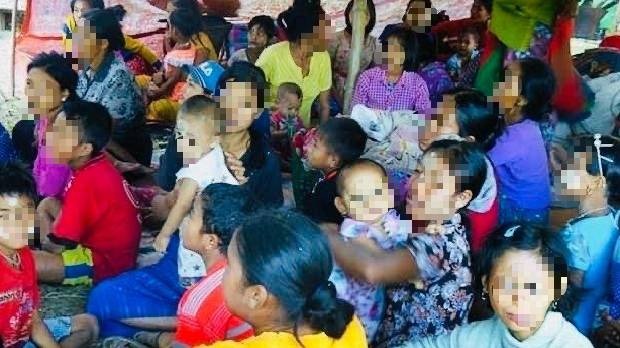Thant Shin Tun
Daw May Win (pseudonym) heard a loud ‘Boom!’ as the neighboring house ignited in flames. The fire, fueled by ammunition fired by the military council, forced locals to flee to what they considered safer places.
Pregnant and near her due date, Daw May Win with a dress she wore had to evacuate to a village she believed would be secure, accompanied by her husband.
In the midst of her escape, she had sudden labor pains, and she had to deliver her baby at a relative’s house in a village along the way.
Daw May Win, desiring a safe and comfortable environment for childbirth amid the risk of artillery shelling, was shocked by the words of the village elders.
“The village elders do not allow pregnant women from elsewhere to give birth in that village,” said Daw May Win.
Daw May Win, originally from one of the wards of Pauktaw, Rakhine, had no choice but to give birth to her child in a village near the city in mid-November 2023 as she sought refuge and safety. But the village rules only doubled her troubles.
An activist in Sittwe mentioned that in many rural and urban areas of Rakhine State, characterized by a lack of development and numerous conflicts, there persist superstitions and discrimination, particularly directed towards pregnant women.
Daw May Win expressed, “The labor pain was unbearable. Since the village inhabitants wouldn’t permit me to give birth, my husband had to carry me to a hut located outside the village for the delivery.”
Supported by her husband and a midwife, Daw May Win successfully gave birth to her child without encountering any risks. However, she mentioned that a lingering sense of contentment remains within her.
In Rakhine State, clashes between the Myanmar Military and the Rakhine Army (AA) since 2018 have compelled pregnant women to give birth while fleeing due to the ongoing fighting and artillery shelling, as shared by Daw May Win’s husband.
“My wife was about to give birth but the village elders did not permit it at all so I did not know what to do. We fled because we were afraid of the heavy artillery but the villagers were scarier than the artillery shelling”, Daw May Win’s husband described his experience. He further emphasized that this village rule is out of sync with the current era and seems like a deliberate imposition of hardship on women.
He questioned, “If you can’t give birth in your own village and have to go to a hospital or a clinic in another village, what if that village also follows those rules?”
A grandmother in her 70s mentioned that in the villages of Rakhine State, certain rules have been established, including the prohibition of alcohol sales, the disallowance of gambling, and pregnant women from other villages being restricted from giving birth in their village.
She mentioned that these villages’ rules were established fifty years ago, and the villages adhering to them continue to observe these regulations, whereas the more progressive villages have abolished such rules.
“When we were younger, we were not permitted to visit any household for a week or a month during our menstruation,” said the grandma.
She added with a laugh that in this contemporary era, pregnant women are even celebrated for giving birth on an airplane.
Similar to Daw May Win, another pregnant woman seeking refuge in a different village within the Ponnagyun refugee camp mentioned that she was not permitted to give birth in the village where she had sought shelter.
“I, myself, seek refuge from the war without a single penny. The village would not allow me to give birth so I had no idea where to head”, expressed the pregnant woman seeking refuge at Ponnagyun.
But luck met another pregnant woman who was almost due, refuge in a village in Ponnagyun. The house owner emphasized that the birth of a child takes precedence over the village rules, considering the paramount importance of human life.
“No matter what anyone says about being unallowed to give birth in this village, I permit it because this is my house”, said the house owner.
He further stated that he could face any punishment for his action because of breaching the village rules. However, no one has taken any action.
A women’s rights activist in Sittwe emphasized the need to abolish outdated and inhumane conservative practices and superstitions, stating that both women and men should actively work towards this goal.
She emphasized that those in power should take steps to abolish such rules and that villagers should communicate with influential individuals to shed light on the existence of these unwarranted regulations in various villages.
Ko Nay Thurein, a humanitarian aid worker, emphasized that in times of danger, whether arising from conflict or disasters, the safety and well-being of pregnant women should take precedence over other concerns.
Ko Nay Thurein emphasized, “Pregnant women are carrying two lives. It is crucial to prioritize the needs of pregnant women over others.”
Daw May Win became a victim of these traditions while refuging from conflict and heavy artillery.
Her daughter, who was given birth at a hut outside the village, is now two months old.
Daw May Win expressed to her daughter, who is just beginning to learn how to smile, “My baby, you must take part in eliminating these useless traditions and rules.”
ကိုယ်ဝန်သည် ကလေးမွေးဖွားခြင်းကို လက်မခံနိုင်သေးတဲ့ ရှေးဓလေ့ထုံးစံတွေ
- ကိုးရီးယားမှာ အောင်မြင်နေတဲ့ ကရင်မိန်းကလေးငယ် အဆိုတော် ဖိုးမူကြီး (သို့မဟုတ်) မာသာထူးဝါး - 25/03/2025
- တစ်ပတ်အတွင်းအမျိုးသမီးဖြစ်ရပ်များ - 22/03/2025
- Media Statement: United Voices from Women’s Rights and LGBTQIA+ Rights Organizations on Dialogues for Gender, Women, Peace, and Security in Myanmar - 21/03/2025




